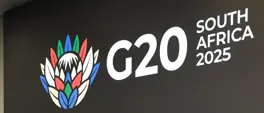Budget speech: 'I'm a lot more worried about invisible tax than VAT' - Maya Fisher-French
Tasleem Gierdien
13 March 2025 | 7:49"Not adjusting the tax tables for inflation is going to have a far bigger impact on us than VAT,” explains financial journalist Maya Fisher-French.
Kfm's Carl Wastie speaks to Financial Journalist Maya Fisher-French about the 2025 budget.
Listen below:
Finance Minister Enoch Godongwana delivered his 2025 Budget Speech on Wednesday, 12 March.
Fisher-French says it's interesting that the budget has a VAT increase split over two years.
"What's very interesting is that we as journalists get a press briefing from the Minister and all the documents before he speaks at 2 pm... Nowhere did they mention this other part. That he only mentioned in the speech and that was, he said, half a percentage point, on 1 May and then another on 1 April 2026... and in his speech, he changed and said, if we don't find money any other way..."
- Maya Fisher-French, financial journalist
"So he's saying, yeah - we'll get the half a percent this year and we'll see about next year and that literally was a change between the press conference at 12 o'clock and him speaking at 2 o'clock - so I think, there's a lot of fear around this VAT increase and how it's being read."
- Maya Fisher-French, financial journalist
However, Fisher-French says she isn't worried about the 0.5% VAT increase.
"Nobody likes paying more tax but it's actually not that significant in our spending pattern."
For example, middle to higher-income people might spend about R10,000 a month on goods and services that get charged with VAT.
So, if you're spending R10,000 and there's a 0.5% increase on that, you're looking at a R50 increase a month on VAT.
What Fisher-French is concerned about is the 'invisible tax'.
"I'm a lot more worried about the invisible tax... not adjusting the tax tables for inflation is going to have a far bigger impact on us than VAT."
- Maya Fisher-French, financial journalist
Fisher-French explains that invisible tax is also known as 'fiscal drag'.
It's when you don't adjust for salary increases as inflation increases, explains Fisher-French.
For example, if you're earning R380,000 a year and you now get a salary increase that's just by inflation to R398,000 - all that's happening is you can still buy the same goods and services as you did last year.
"It's not giving you more money, it's just making sure that your salary keeps up with inflation."
Because the government is not adjusting the tax tables, your tax bill will increase from R63,000 a year to R68,000 a year - by doing this, the government collects an additional R18 billion in taxes.
This was also done in 2024 and a further R16 billion was collected from taxpayers, notes Fisher-French.
"We're sitting at R34 billion more in taxes we are paying without actually realising it."
"So, instead of coming along and saying, 'Oh everybody, we're going to increase the tax rate by 1% - we just hide it by not adjusting the tax tables for inflation. This is incredibly significant... because VAT hurts the poor but if you take someone who earns R8,000 a month in 2023, getting an inflation-adjusted salary increase of 4.8%, they'd be earning R8,700 a month now - that now moves them into a tax threshold because at R8,000 a month, they did not pay tax, now they will start to pay R130 of tax because they enter a tax threshold which hasn't increased by inflation... So, I think this invisible taxation has become worse for people than a 2% increase in VAT."
- Maya Fisher-French, financial journalist
A person earning R8,000 a month would be better off with a 2% VAT increase than with this fiscal drag happening.
"It's hiding tax... So, if you're wondering why you're feeling poorer last year and again this year, it's because of these things."
- Maya Fisher-French, financial journalist
The people who sit with the most tax credits are people who earn between R250,000 to R500,000 a year.
For example, medical costs increase by 10% and 12% and yet tax credits don't increase by inflation.
"There's this constant use of inflation to make us poorer and tax us through inflation and this now really needs to be brought to light because I think if anyone actually understood it, they'd be a lot more upset by the budget."
Fisher-French says people need to start asking questions and understanding what things mean and how they're presented to the public to see real change.
We should be spending on teachers and nurses and maybe not the VIP protection unit, she argues. We are not getting bang for our buck.
"So, I think there needs to be an overall relook at the whole way government spends money and we all know about the corruption... when people start to understand the impact of this on their bottom line, people will start to demand more and get away from this idea that we need to find more tax... it's enough, we don't need to find more tax."
- Maya Fisher-French, financial journalist
Scroll up to the audio player to listen to the interview.
Get the whole picture 💡
Take a look at the topic timeline for all related articles.
















